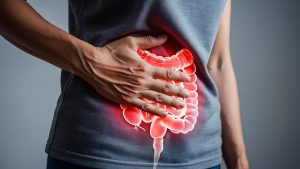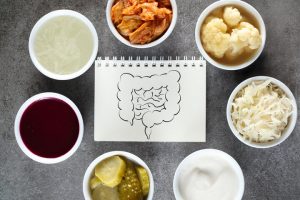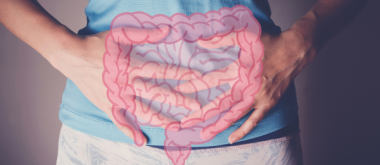Chronic constipation becomes more common with age. Researchers at Mass General Brigham conducted a new study to investigate whether five common dietary patterns could help prevent chronic constipation in middle-aged and older adults. The team observed more than 96,000 participants over several years to determine how long-term dietary habits affected the likelihood of developing this persistent gastrointestinal problem. Their analysis found that people who regularly ate a Mediterranean or plant-based diet were less likely to suffer from constipation. The findings were published in the journal Gastroenterology.
“Chronic constipation affects millions of people and can significantly impact patients’ quality of life,” said lead author Kyle Staller, MD, MPH, of the Division of Gastroenterology at Massachusetts General Hospital, a founding member of the Mass General Brigham health system. “Our findings suggest that certain healthy diets may have benefits for our gut as we age, beyond the well-known cardiovascular benefits.”
How Does Constipation Develop?
Constipation is a common complaint that affects many people throughout their lives. The causes are varied and often the result of a combination of several factors. One of the most common reasons is lifestyle: too little exercise slows down bowel activity, causing stool to remain in the colon longer and more water to be extracted – the result is hard stool that is difficult to pass. A diet low in fiber, with little fruit, vegetables, and whole grains, also promotes constipation, as fiber is important for increasing stool volume and stimulating bowel movement. At the same time, insufficient fluid intake can cause the intestines to thicken the stool further, making it even more difficult to pass.
In addition to lifestyle factors, habits also play a role. Those who regularly delay natural bowel movements—for example, due to time pressure or a lack of toilet facilities—risk their bowels becoming sluggish and defecation becoming increasingly difficult. Stress or emotional strain can also affect bowel function, as the digestive system is sensitive to psychological states. In addition, certain medications, such as strong painkillers from the opioid group, some antidepressants, or antacids containing calcium and aluminum, can slow down bowel movements and thus lead to constipation.
Hormonal changes are another important factor. Many women experience a slowdown in bowel activity, especially during pregnancy or menopause. Diseases such as diabetes, hypothyroidism, neurological disorders, or irritable bowel syndrome can also impair digestion and promote chronic constipation. In rare cases, there is a structural cause, such as narrowing of the intestine or disorders of the pelvic floor muscles, which hinder the normal transport of stool. Overall, constipation is a complex symptom whose causes should be carefully examined in order to enable appropriate treatment and avoid long-term discomfort.
Constipation and Menopause
Constipation can occur more frequently during menopause for several reasons, as the hormonal changes during this phase of life have a direct and indirect effect on bowel function. During menopause, estrogen levels gradually decline. Among other things, estrogen influences water retention in the tissue as well as the flexibility and blood flow of the intestines. When estrogen levels drop, the intestines often become sluggish and stools can become harder because the body retains less water in the digestive tract. At the same time, progesterone levels also decrease—a hormone that, in high amounts, has a relaxing effect on the smooth muscles of the intestines. The overall hormonal shifts can therefore cause irregular bowel movements, which promotes constipation.
Another factor is the change in the pelvic floor. With increasing age—and especially after childbirth—the pelvic floor muscles can lose their elasticity. Since the pelvic floor plays a central role in bowel movements, weakening can contribute to incomplete or difficult bowel movements. In addition, many women in menopause also suffer from stress, sleep disorders, or an unbalanced lifestyle, which can further impair bowel function.
Indirect factors also play a role: Hormonal changes can alter appetite, exercise, or eating habits. Less exercise, shorter nights, or changes in fluid intake are typical side effects of menopause—all factors that can further exacerbate constipation. Overall, this creates an interplay of hormonal, muscular, and lifestyle influences that explains why many women in menopause struggle with constipation more frequently.
Healthy Eating Habits and Risk Reduction
Previous studies have shown that a healthy diet can alleviate constipation symptoms, but this study is the first to prove that certain diets can actually prevent the development of chronic constipation. “We always assumed that the benefits of a healthy diet were due to fiber, but our analyses showed that the positive impact of these healthy diets on constipation is independent of fiber intake,” said Staller.
Using information from the Nurses’ Health Study, the Nurses’ Health Study II, and the Health Professionals Follow-Up Study, the researchers assessed the long-term dietary habits of middle-aged and older adults and identified who later suffered from chronic constipation, defined as symptoms lasting at least 12 weeks within a year. The study evaluated five diets: the Mediterranean diet, the plant-based diet, the low-carbohydrate diet, the Western diet, and the pro-inflammatory diet. Participants who consistently followed a Western or pro-inflammatory diet were more likely to develop chronic constipation, while those who followed a low-carbohydrate diet did not show a strong influence on constipation risk. “Our findings suggest that a diet rich in vegetables, nuts, and healthy fats may help prevent chronic constipation in middle-aged and older adults,” Staller said.
How to Support a Healthy Gut
Several simple but effective measures can help prevent constipation in old age. As we age, bowel activity often slows down somewhat, and certain habits, medical conditions, or medications can exacerbate the problem. That’s why it’s worth addressing several issues:
Drink Enough Fluids
Many older people don’t drink enough—often out of habit or because they feel less thirsty. About 1.5 liters of fluid per day (water, tea, heavily diluted juice spritzers) help the intestines keep stools soft. However, people with heart or kidney problems should consult their doctor about the right amount to drink.
Fiber-rich Diet
A diet rich in vegetables, fruit, legumes, and whole grains increases stool volume and stimulates the intestines. Oatmeal, flaxseed (ground and with sufficient liquid), plums, and pears are particularly suitable. Fiber intake should be increased slowly so that the intestines can adjust.
More Exercise in Everyday Life
Even moderate exercise such as daily walks, light gymnastics, or cycling activates bowel movement. Exercises to strengthen the pelvic floor can also help to facilitate emptying.
Fixed Toilet Routine
Regular times for going to the toilet—especially after breakfast, when the bowels are naturally more active—can help to establish a natural rhythm. It is important to take your time and not suppress the urge to go.
Have Your Medication Checked
Many medications can cause constipation, including strong painkillers (opioids), some antidepressants, iron supplements, and calcium-containing medications. A doctor can check whether alternatives are available.
Reduce Stress and Promote Relaxation
The intestines are very sensitive to psychological stress. Relaxation techniques such as breathing exercises, yoga, or meditation can have a positive effect on digestion.
Probiotics or Soluble Fiber
For some people, probiotics (e.g., certain lactic acid bacteria) or soluble fiber such as psyllium husks help to support the intestinal flora and improve stool consistency. Here, too, it is important to drink enough fluids.
Medical Examination for Persistent Symptoms
If constipation is new, very severe, accompanied by pain, weight loss, or blood in the stool, it should be examined by a doctor to rule out serious causes.








